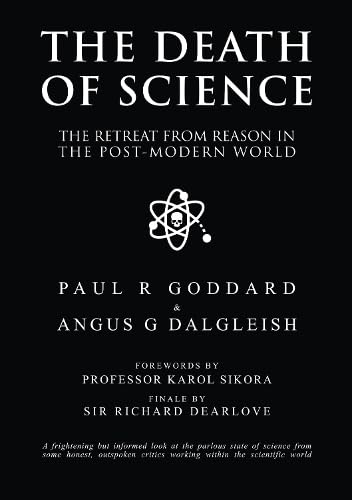

The Death of Science: The retreat from reason in the post-modern world
M**A
ein großer Missstand wird beschrieben
Leider ist die These, wonach Wissenschaft tot ist, seriös dokumentiert und akribisch recherchiert. Ja, Wissenschaft stirbt, wenn man sie in die Ist das nicht gegeben , wird sie zu einer Religion. Kennzeichen sind die Dogmen, die das Nachfragen verhindern sollen.
T**Y
Brilliant in parts but flawed, a must read.
Having listened to conversations between John Campbell and Professor Dalgleish, and seeing that it contains chapters by some brave iconoclasts, some of my scientific ‘heroes’, I had immensely high expectations regarding the contents of ‘The Death of Science’. And although there is some excellent and thought-provoking evidence based information within this book I was somewhat disappointed. However it remains a necessary read, partly because of the scientific evidence it refers to, partly because of the scientific evidence and wider ‘real world’ research it ignores and the underpinning flaws in academia it reveals. For realistic balance ‘The Death of Science’ should be read along with ‘Science Fictions’ by Ritchie and ‘Cracked’ by Davies, for starters. Although less wide-ranging these two books underline the real causes corrupting science, and they are little to do with ‘political correctness’ as ‘The Death of Science’ appears to suggest in parts.Where the reportage of science, and the actual science being funded, is affected by politics the main source of this political interference is via lobbying by immensely rich and powerful corporations in support of the globalised neo-liberal capitalist ideology, the current economic status quo, which is increasingly creating greater inequality and undermining democracy. Chris van Tulleken identifies this in his recent book on the food industry. Secondly, science is being murdered by ‘careerism’ in academics (as the recent scandals at Harvard and Stanford clearly demonstrate). The relatively puny lobbies of the ‘woke’ and the PC are fundamentally irrelevant, unless some corporation is making money out of such people.This results in a degree of ‘cherry picking’ from personal perspectives regarding the scientific data being referenced and some of the individuals quoted in the text. I have had a thirty years career in the NHS working primarily in Mental Health, inclusive of completing a MSc. and having to justify my role by referencing the wider scientific research. This enables me to understand the degree of ‘cherry picking’ by self-interested professionals and the overall corruption of science by ‘Big Pharma’. This has been detailed over many decades; e.g. in books like ‘Let Them Eat Prozac’ by Professor David Healy, ‘Bad Pharma’ by Dr. Ben Goldacre, ‘The Emperor’s New Drugs’ by Professor Irving Kirsch and ‘Deadly Medicines and Criminal Organisations’ by Professor Peter Götsche. It is, perhaps, significant that none of these people are included in this book. Indeed the dominance of the ‘chemical imbalance model’ and the use of drugs as the primary treatment in Mental Health has been a very lucrative and career generating mental health disaster. There are better models that generate more effective, if less remunerative, interventions (see ‘Models of Madness’ Edited by Read, Bentall and Mosher, in the original edition, and note ‘The Soteria Project’ in particular.) If you want up to date information regarding the science around nutrition then ‘Ultra-Processed People’ by van Tulleken and ‘Unprocessed’ by Wilson are good places to start.A few chapters are superficial and/or partial as you would expect in a book with such a wide range of contributors, but overall it is a brilliantly though-provoking book, a ‘must read’ ‘round up’ of the current, unacceptably corrupt and corrupting status quo. Although I would have preferred something even more radical. However, I would argue that a great deal of wider background knowledge is required in the reader to enable the kind of ‘critical thinking’ approach the gist of this book demands from all of us. Science is about eternal doubt and vigilance, even of the people who say so.Mick Skelly MSc. MCSP.
C**R
Brilliant book and a "must read"
A clear picture is given of how scjentific research is driven by commercial interests, and not a search for the truth.
Trustpilot
4 days ago
1 month ago